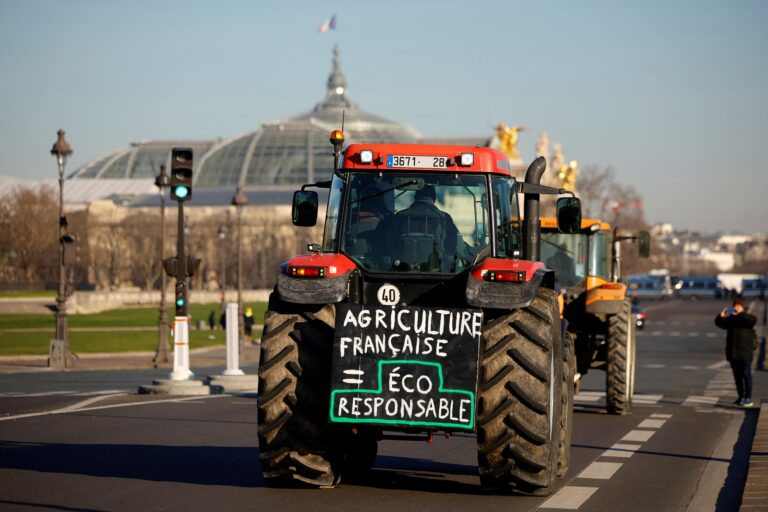Introduction:
In a striking display of agricultural unrest, French farmers took to the streets of Paris on Wednesday, maneuvering their tractors through the city’s iconic avenues to demand looser regulatory measures that they argue are jeopardizing their livelihoods. The demonstration, organized by various farmer unions, comes amidst growing frustrations over stringent EU regulations and rising production costs that have placed considerable strain on rural communities. As tractors rumbled past historic landmarks, farmers voiced their concerns over policies they feel undermine the very foundation of France’s agricultural sector, pushing for a dialogue with the government to secure a more sustainable future.
French Farmers Rally in Paris to Challenge Agricultural Regulations
In a dramatic display of solidarity, thousands of French farmers descended on Paris, driving their tractors through the city streets to voice their concerns over stringent agricultural regulations. The event, which garnered significant media attention, highlighted the farmers’ frustrations regarding policies they believe hamper their ability to operate competitively. Protesters waved banners demanding the government reconsider the impact of these regulations on small and medium-sized farms, emphasizing the need for a more agriculture-friendly framework that supports local producers.
The demonstration featured a variety of speakers, including farm leaders and local politicians, all of whom underscored the vital role of agriculture in France’s economy. Farmers argued that current policies, which often prioritize environmental standards, neglect the financial viability of their operations. Participants at the rally were united by key demands, including:
- Relaxing bureaucratic procedures that hinder production.
- Increasing financial support for farmers impacted by changing market conditions.
- Ensuring fair pricing to sustain agricultural livelihoods.
| Major Concerns | Proposed Solutions |
|---|---|
| Bureaucracy | Simplified processes |
| Financial Strain | Increased subsidies |
| Market Competitiveness | Fair pricing systems |
Impact of Stricter Farming Rules on Rural Economies
The push for looser regulations by French farmers is not merely a protest; it reflects the growing concerns over the long-term viability of rural economies under stringent farming rules. Farmers argue that these regulations, aimed at promoting sustainability and environmental protection, often overwhelm them with compliance costs and operational restrictions. This situation has led to significant shifts within the agricultural sector, causing several farms to reduce their scale or shut down altogether. As a result, local job losses and declining investment in rural areas have emerged, undermining communities that rely heavily on agricultural productivity.
Moreover, the economic ripple effects extend beyond immediate job losses. Local businesses—such as supply stores, equipment manufacturers, and service providers—face diminished sales as farmers cut back on expenditures due to reduced profitability. The combination of fewer jobs and decreased spending power contributes to a broader economic downturn in rural areas, as illustrated in the table below:
| Economic Indicator | Impact of Stricter Rules |
|---|---|
| Farm Closures | Increased by 30% |
| Local Business Revenue | Decreased by 20% |
| Job Losses | Estimated at 10,000 positions |
| Investment in Rural Areas | Reduced by 15% |
As farmers express their frustrations in Paris, the implications of these regulations raise critical questions about the balance between environmental stewardship and economic survival. Advocates for policy change emphasize the need for frameworks that support sustainability without undermining the livelihoods of those who form the backbone of rural economies. It is essential for policymakers to consider how their decisions affect not just the land, but also the people who cultivate it.
Voices from the Field: Farmers Share Concerns over Compliance Burdens
In a dramatic show of solidarity, thousands of farmers driving tractors converged on Paris to voice their frustrations over stringent agricultural regulations. The farmers expressed their concerns about compliance burdens that they argue threaten their livelihoods and the future of French agriculture. Amidst the roar of engines and the sight of heavy machinery, they highlighted a series of challenges that include:
- Increased paperwork: Farmers are spending too much time on compliance instead of focusing on productivity.
- Environmental regulations: Stricter rules regarding pesticide usage and land management are seen as excessive.
- Financial strain: Many farmers feel that the costs associated with compliance are eroding their already thin profit margins.
Protesters carried banners with messages urging policymakers to listen to their plight and reconsider the pace of regulatory changes. In conversations with local reporters, many farmers shared personal anecdotes illustrating how these regulations have affected their daily operations. To further illustrate their concerns, several farmers provided a breakdown of the regulatory impacts:
| Regulation Type | Impact |
|---|---|
| Pesticide Restrictions | Limited application frequency, affecting crop viability. |
| Soil Management | Mandatory practices increasing operational costs. |
| Water Usage Regulations | Restrictions leading to irrigation challenges during droughts. |
Potential Policy Reforms to Support Sustainable Agriculture Practices
In response to the ongoing protests by farmers advocating for looser regulations, it is crucial to explore potential policy changes that could foster sustainable agricultural practices. These reforms could include:
- Increased subsidies for eco-friendly techniques: Financial incentives to adopt practices like cover cropping, conservation tillage, and organic farming.
- Streamlining regulatory processes: Simplifying compliance requirements for farmers transitioning to sustainable methods without compromising environmental protections.
- Support for research and development: Funding innovative agricultural research that promotes sustainability, resilience, and efficiency in farming systems.
- Community-supported agriculture programs: Encouraging local consumption through initiatives that connect farmers directly with consumers.
Furthermore, collaboration between farmers and government is essential to develop a framework that prioritizes both economic viability and environmental stewardship. This could involve:
- Establishing pilot programs: Testing new sustainable farming practices in various regions to measure their effectiveness.
- Education and training initiatives: Providing resources and workshops to familiarize farmers with sustainable practices and technologies.
- Creating performance-based incentives: Rewarding farmers who demonstrate environmental improvements and sustainability in their operations.
| Policy Proposal | Impact on Farmers | Environmental Benefit |
|---|---|---|
| Increased Subsidies | Financial support for transitioning | Encourages eco-friendly practices |
| Regulatory Streamlining | Less paperwork, more focus on farming | Maintains essential protections while easing burden |
| Research and Development | Access to innovative farming methods | Promotes sustainable agriculture solutions |
Final Thoughts
In conclusion, the recent demonstration by French farmers in Paris highlights the ongoing tensions between agricultural regulations and the farming community’s call for more flexibility. As they navigate the complexities of environmental policies and economic pressures, these farmers are urging the government to reconsider the impact of stringent regulations on their livelihoods. The mobilization of tractors in the heart of the capital not only underscores their determination but also signals a pivotal moment in the dialogue between policymakers and the agricultural sector. As this situation develops, it will be crucial to monitor how both sides engage to find a workable balance that supports sustainable farming while maintaining environmental standards.



